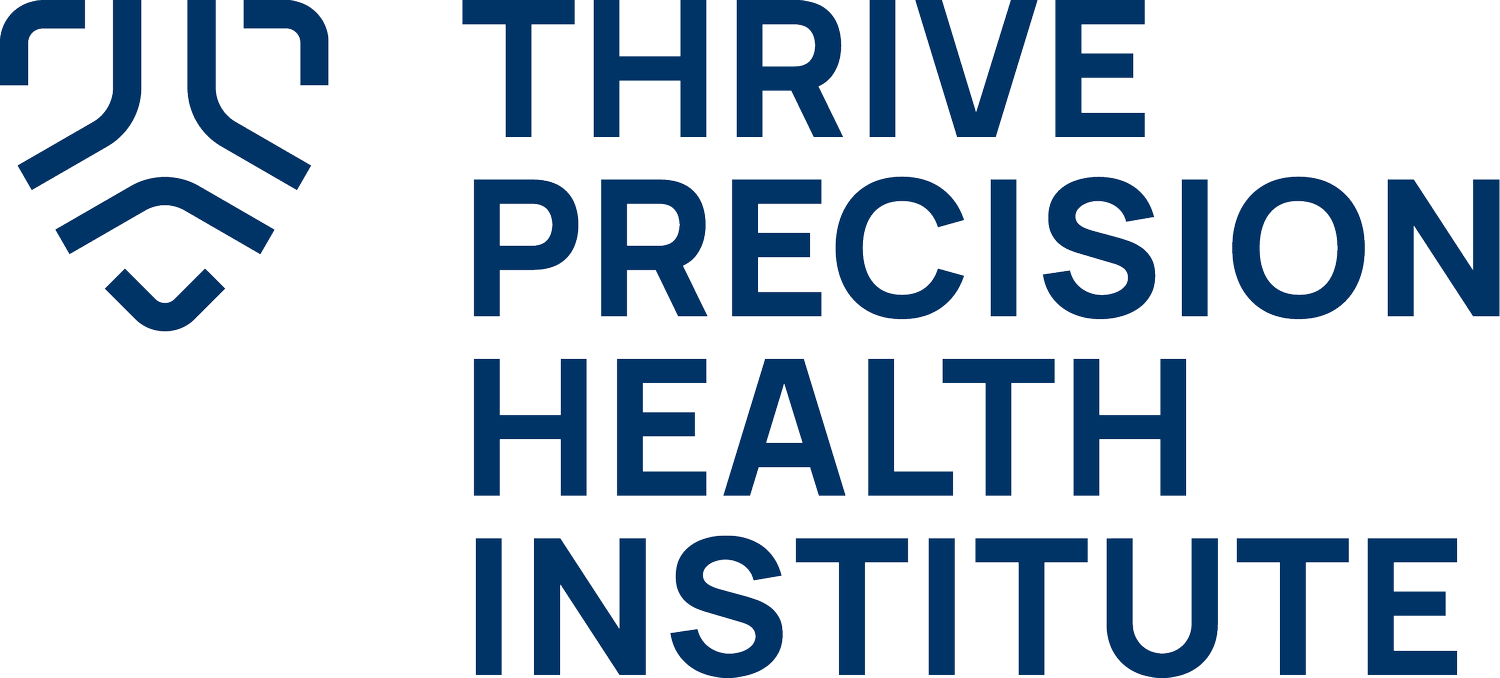The Digital Clinic and Patient
Advancing the world’s ingenuity.
Overview
.png)
The Digital Clinic and Patient
Thrive Precision Health Institute is revolutionizing healthcare delivery through its digital clinic model, designed to scale globally and offer personalized, patient-driven care. Utilizing Web 3.0 and AI technologies, this initiative aims to transform the traditional healthcare system by providing continuous, accessible, and tailored medical services, especially catering to the needs of those with diabetes. This decentralized approach not only enhances patient outcomes but also significantly reduces healthcare costs and barriers, especially in underserved areas.
State of Affairs:
The digital clinic that can scale securely across the globe.
In the current healthcare paradigm, the centralized model of doctor-centric and 'sick care' systems predominates, dictating the manner in which healthcare services are delivered, accessed, and managed. This traditional approach is increasingly seen as both inefficient and impersonal, contributing to escalating healthcare costs without a corresponding improvement in patient outcomes. Centralization places decision-making power in the hands of a select few—namely, pharmaceutical companies, insurance providers, and regulatory bodies—often leading to a one-size-fits-all approach to patient care. This model not only overlooks the individual nuances of each patient's health condition but also restricts patients' autonomy over their healthcare decisions. As costs soar, the quality and accessibility of healthcare services diminish, creating barriers to care that disproportionately affect underserved populations. The result is a healthcare system that is more focused on disease management than on patient-centered care, prevention, and holistic wellness.
In underserved regions, the low-cost, scalable nature of decentralized systems could revolutionize access to healthcare, offering a lifeline to those currently beyond the reach of traditional services. This technology-driven approach has the potential to ‘leapfrog’ the bloated and inefficient healthcare models of the Western world, bypassing legacy systems and infrastructure to deliver direct, efficient, and effective healthcare solutions. Through decentralization, the world can truly be brought to the patient’s doorstep, creating a paradigm shift that empowers nations to provide equitable, quality healthcare for all, regardless of geographical and economic barriers.
Overview :
The advent of precision healthcare, powered by digital and decentralized technologies, presents a transformative opportunity to shift this paradigm. Unlike the centralized model, a decentralized healthcare system, especially one underpinned by Web 3.0 technologies, promises a future where healthcare is personalized, patient-driven, and accessible. In this envisioned ecosystem, patients are connected to their data 24/7 through digital clinics, and AI technologies play a crucial role in customizing care workflows based on individual patient needs, including molecular data and phenotypic information provided by the patients themselves. This approach not only empowers patients to take an active role in their healthcare journey but also enables the delivery of care that is truly tailored to each individual’s unique biological makeup. By leveraging the power of decentralization and AI, the healthcare system can evolve from a reactive, one-size-fits-all model to one that is proactive, personalized, and patient-centric, ultimately reducing costs and improving outcomes for individuals and communities alike.
Why we support the work:
Supporting research in decentralized and digital healthcare systems, particularly in the context of the global diabetes pandemic, is not just a matter of technological advancement; it's a crucial step towards addressing one of the most pressing health crises of our time. The diabetes epidemic, with its disproportionate impact on underserved populations and developing nations, calls for innovative solutions that transcend traditional healthcare models. Decentralized healthcare, leveraging the power of Web 3.0 and AI, offers a path to personalized, accessible, and cost-effective care. By investing in this research, we are championing a cause that has the potential to radically transform the lives of millions of people living with diabetes, offering them hope and practical solutions to manage their condition. This is especially critical in areas where the healthcare infrastructure is either strained or virtually nonexistent, allowing these communities to leapfrog into a new era of health and wellness that is informed by cutting-edge technology and tailored to meet their unique needs.
Moreover, the push towards a decentralized healthcare model aligns with a broader imperative to democratize healthcare globally. It represents a significant shift towards a system where patients are empowered with control over their health data, and where care is proactive, predictive, and personalized. Supporting this area of research sends a powerful message that the global community is committed to overcoming the barriers imposed by geography, socioeconomic status, and outdated healthcare systems. It's an investment in a future where the burden of diabetes—and other chronic diseases—can be significantly alleviated through smart, scalable, and patient-centered healthcare solutions. As such, backing this work is not only a moral imperative but a strategic one, offering a beacon of hope for a healthier planet where the best of technology and human ingenuity come together to combat the diabetes pandemic.
What we are doing:
At the heart of our mission lies the ambitious endeavor to redefine healthcare delivery through the integration of cutting-edge technologies: generative AI, decentralization, cyber defense mechanisms, big data analytics, and patient-centered design. Our institute is committed to pioneering the research and development of a healthcare architecture that not only meets the contemporary demands for scalability and security but also embraces the nuances of cultural and ethical diversity across the globe. This innovative framework is designed to maintain the core principles of a decentralized platform while offering the flexibility needed to adapt to various cultural contexts, ensuring that every patient, regardless of their location, receives care that resonates with their values and lifestyle.
Central to our approach is the convergence of AI-driven care automation with the dynamism of real-time research, leveraging a global dataset that is unprecedented in both scope and depth. By moving beyond the traditional confines of medical research, which often relies on relatively small cohorts, our vision encompasses a system where tens or hundreds of thousands of patients contribute their data in real-time. This massive pool of information allows for AI algorithms to refine and adjust treatment protocols at an individual level, marking a departure from the generalized 'population health' strategies that fail to address the unique needs of the individual. Such a model not only enhances the precision of care but also accelerates the discovery of novel treatments and interventions, paving the way for breakthroughs that were previously inconceivable.
Our commitment extends to ensuring the utmost security and privacy of patient data, incorporating advanced cyber defense technologies to safeguard against unauthorized access and breaches. In this era of digital health, the importance of robust security measures cannot be overstated, especially when dealing with sensitive health information on a global scale. By prioritizing patient trust and data integrity, we are setting a new standard for what is possible in healthcare innovation.
Through this holistic integration of AI, big data, and patient-centric design within a decentralized framework, we are not just envisioning a future of healthcare; we are actively creating it. Our work represents a bold step forward in making personalized, precise medical care a reality for individuals around the world. By supporting this transformative journey, our funders, donors, sponsors, and contributors are part of a global movement that is reshaping healthcare for the better, ensuring that every individual can access the care they need, when they need it, tailored specifically to them. This is the future we are building—a future where healthcare is personalized, accessible, and secure, driven by the incredible potential of technology and human ingenuity.
Funding Priorities:
Funding priorities for a project as transformative as the integration of generative AI, decentralization, cyber defense, big data, and patient-centered design into healthcare requires a strategic approach. The goal is to revolutionize the patient experience, making healthcare more accessible, personalized, and secure. Given the complexity of these ambitions, prioritizing funding around key activities and in a logical sequence is crucial to success.
By structuring funding priorities, resources are allocated efficiently to build a comprehensive, secure, and patient-focused healthcare system from the ground up, ensuring each phase builds on the success of the last and leads to a truly revolutionary outcome.
- Infrastructure Development for Decentralized Systems: The first funding priority should be establishing a robust, scalable, and secure infrastructure that supports decentralization. This includes the development of blockchain or similar technologies for secure data exchange, storage solutions that ensure data integrity and privacy, and the foundational platforms that will host the decentralized applications (dApps) for healthcare.
- Generative AI and Big Data Analytics: Once the infrastructure is in place, investment in generative AI technologies and big data analytics becomes paramount. This involves funding the development of algorithms that can process and analyze vast amounts of health data to generate personalized treatment plans, as well as systems that can learn and adapt over time to improve their accuracy and effectiveness.
- Cyber Defense Mechanisms: Parallel to the development of AI and data analytics capabilities, significant resources must be allocated to establishing state-of-the-art cyber defense systems. This ensures the protection of sensitive health data against potential cyber threats, maintaining the trust of all stakeholders and complying with global data protection regulations.
- Clinician Engagement and Training: Before fully involving patients, it's critical to focus on clinicians who will interact with these new technologies. Funding should support comprehensive training programs to familiarize healthcare providers with the new systems, ensuring they can effectively integrate these tools into their practice and provide feedback for further improvements.
- Patient-Centered Design and Experience: With a solid technological foundation and clinician buy-in, attention turns to optimizing the patient experience. This involves developing interfaces and interaction models that are intuitive, accessible, and tailored to meet the needs of diverse patient populations. Funding should support user experience research, design iterations, and the creation of patient education materials to ensure successful adoption.
- Pilot Programs and Clinical Trials: The next step involves rolling out pilot programs or clinical trials to test the efficacy and user-friendliness of the system in real-world settings. Funding priorities should include the recruitment of participants, operational costs of trials, and the analysis of data collected during these pilots to refine and improve the system.
- Global Expansion and Localization: As the system proves successful, resources will be needed to adapt and expand the technology to different regions. This includes localization efforts to ensure the system respects cultural differences and meets specific local needs, as well as funding for scaling infrastructure and training programs in new areas.
- Sustainability and Future Research: Finally, ensuring the long-term sustainability of the initiative is essential. Funding should be allocated for ongoing research and development, continuous improvement of AI models and cyber defense mechanisms, and the exploration of new technologies to keep the system at the forefront of healthcare innovation.
How we evaluate success:
To effectively evaluate the success of implementing a transformative healthcare project that leverages generative AI, decentralization, cyber defense, big data, and patient-centered design, setting clear Key Performance Indicators (KPIs) is essential. These KPIs should reflect the project’s overarching goals of improving healthcare accessibility, personalization, and security, while also ensuring the efficient use of funds. Here’s how these priorities can be translated into measurable outcomes:
- Infrastructure Development and Stability:
- KPI: Uptime and reliability of the decentralized platform.
- KPI: Scalability of the system to handle increased user load.
- Generative AI and Big Data Analytics Effectiveness:
- KPI: Accuracy and precision of AI-generated treatment recommendations.
- KPI: Reduction in time to diagnose or develop treatment plans.
- Cyber Defense Strength:
- KPI: Number of successful cyber-attacks/incidents.
- KPI: Time to detect and respond to security breaches
- Clinician Engagement and Training:
- KPI: Number of clinicians trained to use the new system.
- KPI: Clinician satisfaction and usability scores.
- Patient-Centered Design and Experience:
- KPI: Patient satisfaction and experience scores.
- KPI: Patient engagement rates with the platform.
- KPI: Accessibility score, measuring how the system accommodates diverse patient needs.
- Pilot Programs and Clinical Trials Success:
- KPI: Achievement of clinical trial objectives.
- KPI: Patient health outcomes and improvement metrics.
- KPI: Rate of adoption by patients and clinicians post-trial.
- Global Expansion and Localization:
- KPI: Number of regions or countries where the system is deployed.
- KPI: Localization effectiveness, measured by regional user satisfaction.
- Sustainability and Ongoing Research:
- KPI: Funding levels secured for future development.
- KPI: Number of new innovations or improvements implemented annually.
- Overall System Performance:
- KPI: Reduction in overall healthcare costs for users.
- KPI: Improvement in the quality of life for patients with chronic conditions.
- KPI: Increase in the global accessibility of quality healthcare services.
These KPIs provide a comprehensive framework for assessing the impact and effectiveness of the project from various angles—technical performance, user satisfaction, clinical outcomes, and scalability. Regular monitoring and evaluation against these indicators will not only measure progress towards achieving the project's objectives but also inform ongoing improvements to ensure the initiative remains responsive to the needs of all stakeholders involved.
Our Team
Values capture what is most important to an organization. MacArthur’s core values are deeply ingrained principles that embody who we are, what we stand for, and how we work.
Our values represent a core set of beliefs that guide how our organization conducts itself and builds trust-based relationships with partners and grantees. Our values guide our decisions, behaviors, and reflect how we seek to serve our communities and work together to create a more just, verdant, and peaceful world.
We live our mission through the Just Imperative, which charges us to lead with a commitment to justice.

Dr. Robert Bouvier

Ky H. Le

Open
.png)
Jonathan Lakey

TBD

